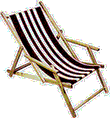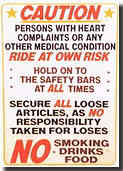Saturday, May 12, 2007
Martin & Lewis
 Dean & Me (A Love Story), by Jerry Lewis and James Kaplan
Dean & Me (A Love Story), by Jerry Lewis and James KaplanIn July 1946, when a featured singer was fired, Jerry Lewis got Dean Martin a gig at Paul "Skinny" D'Amato's large, sleazy 500 Club in Atlantic City on the pretext that they did some funny stuff together, which they had fooled around with a little bit back in New York when they were on the same bill. They were hardly a "team." They didn't even know each other that well. With his wife & son in Newark, Jerry was lonely & also saw a chance to split the rent on his cheap hotel room. When they didn't perform the promised act, Skinny - & his muscle partner, Irwin "Wolfie" Wolf, ordered them to do comedy. So, at a late show, before an audience of about 20, Martin & Lewis improvised a routine that must have seemed completely insane at the time, if Jerry smashed as many dishes & scissored as many ties as he says. They were instantly successful. They packed audiences into the nightclub to see a 20 year old playing an adenoidal, out-of-control 8 year old, & a handsome, bon vivant singer reacting to the crazy kid with near indifference & deadpan one liners. Skinny gave them a huge raise & extended their booking through August. Less then two years later they tore up the Copacabana in New York. In August 1948 they did the same before a celebrity audience at Slapsy Maxie's in Hollywood & were signed to a movie contract with Paramount. They handled their fast rise smartly & professionally, & were the most successful comedy act in America until they broke up in the summer of 1956, a decade at the top. Jerry Lewis tells this story in Dean & Me. It needs to be told. Martin & Lewis are a disappearing act.
The most interesting sections of the book are about the formative weeks in Atlantic City & their period as a hot, hip new nightclub act working up to the Copa engagement. This backstage story is told anecdotally, & we just have to take Jerry's word for it. Dean never had much to say about it; he never had much to say about anything. It's easy to accept that Jerry provided most of the team's energy & ambition. Dean was, as they say, a "natural" as a singer, straight man, comedian, & actor. Jerry's main purpose in Dean & Me is to spotlight & credit his partner's importance as a comedian in their comedy act. If Dean was ever concerned about flopping, he never showed it.
I've seen some of the Martin & Lewis movies- none of them especially good, although they have their moments, & clips from their TV appearances. One doesn't really get from any of them whatever it was that made Martin & Lewis so novel, so fabulously successful as a nightclub act immediately after World War II. Jerry acknowledges the team isn't served well on film, but blames it mostly on producer Hal B. Wallis (who later handled Elvis just as poorly). Jerry understands why the anarchic spirit of the team was so appealing to a nation settling down & heading into an era of middle class conformity & anti-communist paranoia, & the relationship of their style to jazz. But Martin & Lewis performed nightclub sets that ran well over two hours when they were cooking, & no one bothered to set up cameras & film them - certainly not in the Forties. I don't know what their act was in that context, how they made it flow, or how they made it reliably entertaining. I only know the bits & shticks that went into their movies & TV shows. They must have been improvising like crazy during those first two years. Jerry never mentions the team actually rehearsing. Dean, of course, was notorious for how much he hated rehearsing. He was a one-take guy on the movie set if he had any say. His later adoption of the Friar's Club "Roast" format for TV was intended to do away with rehearsals completely. No more dancers, no more duets. Just cue cards. Did Martin & Lewis informally work out on stage & remember the various routines that comprised their act? Because when they were doing two or three full shows a night, or seven short performances in the movie/vaudeville format, they had to be funny whether they were inspired or not. Jerry doesn't get into the creative nuts & bolts of the Martin & Lewis performing machine, & I wish he had.
The chronology also gets confusing, as Jerry jumps back & forth to various points in their years together. More photos would have been good. But Jerry's tremendous love & respect for Dean Martin is undeniable. We learn that Dean gave Jerry his trademark haircut, & Jerry insisted they perform in tuxes, which became Dean's trademark attire. Jerry claims that Dean's impassive facade did fall on occasion - difficult as it is to envision Dean hugging & crying, & says their relationship was strong for all but the final 10 months, & that they were never enemies after the breakup. Jerry gets into the unavoidable mob associations from working in nightclubs & Vegas; his dealings with the wiseguys were helped by the fact that early on he paid off a huge Vegas gambling debt to the penny. Dean & Me is an entertaining, quick read, particularly for the look at Atlantic City just before the resort's long slide down.
After Skinny demanded a comedy act, Jerry quickly jotted down a few ideas on a greasy paper bag that had held a pastrami sandwich. They never used those bits, but Jerry still has the bag, locked away in a safe deposit box.
By the way, Jerry's early solo movies - both his own & those directed by Frank Tashlin - are pretty funny. He's had an amazingly long career for a performer who was pushed out to the margins of popular entertainment 40 years ago. Jerry wants us to remember how important, how big Martin & Lewis were in their time.
Labels: what I'm reading
Comments:
<< Home
"If a nation expects to be ignorant and free, in a state of civilization, it expects what never was and never will be." Thomas Jefferson
Skinny D'Amato figures prominently in the book I'm reading now about Sammy Davis Jr. It was with his permission that Sammy was able to do "Golden Boy" on Braodway. It's easy to forget how enmeshed the mob, the clubs and the performers were back then. ( Dino Martin Peters should be here any minute now.)
I was born in 1952 in Las Vegas. We weren't from Vegas ... my family was just working there.
My aunt was a dancer at the Moulin Rouge, the only club in Vegas that was open to blacks at that time.
My dad played in a house band at the Desert Inn, and my mother was a cigarette/hatcheck girl at an after hours club off the strip.
Back then, the Rat Pack was just getting into their groove.
After we moved back to Hollywood, we returned to Vegas often, as one member of the family (or another) had some gig for six to eight weeks each summer. We generally rented a house for the time, and of course, there was the complimentary room at the hotel (usually the Frontier, but sometiems the Riviera.) Kids were not normally a fixture in Vegas in those days, and my cousins and I enjoyed the relative freedom we had in those hotels.
Vegas in the 1950's and early 1960's was something to behold. I have absolutely no interest in the Vegas of the later years. I do have some pretty cool pictues from that era, though.
As a kid, I met Sammy, and Frank and even Dean. I went to Dean Martin's daughter's wedding in the late 60's at their home in Beverly Hills (my aunt presided over the ceremony). Jerry was not so nice, not as nice as the others. My aunt tells one story about a movie she worked on with Jerry, and it was during the Christmas season. Jerry had all the extras line up outside his trailer, and he simply "tossed" Christmas gifts out the door of the trailer to the unsuspecting extra.
Tacky.
My aunt was a dancer at the Moulin Rouge, the only club in Vegas that was open to blacks at that time.
My dad played in a house band at the Desert Inn, and my mother was a cigarette/hatcheck girl at an after hours club off the strip.
Back then, the Rat Pack was just getting into their groove.
After we moved back to Hollywood, we returned to Vegas often, as one member of the family (or another) had some gig for six to eight weeks each summer. We generally rented a house for the time, and of course, there was the complimentary room at the hotel (usually the Frontier, but sometiems the Riviera.) Kids were not normally a fixture in Vegas in those days, and my cousins and I enjoyed the relative freedom we had in those hotels.
Vegas in the 1950's and early 1960's was something to behold. I have absolutely no interest in the Vegas of the later years. I do have some pretty cool pictues from that era, though.
As a kid, I met Sammy, and Frank and even Dean. I went to Dean Martin's daughter's wedding in the late 60's at their home in Beverly Hills (my aunt presided over the ceremony). Jerry was not so nice, not as nice as the others. My aunt tells one story about a movie she worked on with Jerry, and it was during the Christmas season. Jerry had all the extras line up outside his trailer, and he simply "tossed" Christmas gifts out the door of the trailer to the unsuspecting extra.
Tacky.
You have stories to tell.
I don't think Jerry's a "nice" person. Dean was much more affable, but both of them were difficult men to be around, artists with brilliantly crafted masks. That comes across in the book.
I don't think Jerry's a "nice" person. Dean was much more affable, but both of them were difficult men to be around, artists with brilliantly crafted masks. That comes across in the book.
Try Nick Tosches' bio of Dean Martin, Dino, for a twisted take on it. Tosches takes quite a few liberties with Dean's internal dialogue but the writing is hypercharged throughout.
Post a Comment
<< Home
















